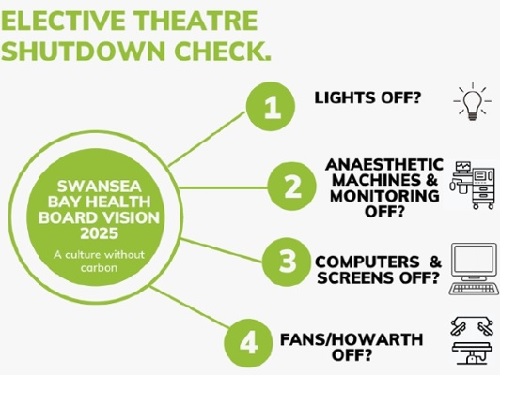Switched on Swansea Bay theatre staff are making energy and financial savings by turning off specialist equipment when it is not in use.
Hospital operating theatres are highly-specialised areas which utilise powerful, high-turnover ventilation systems, high-level lighting, and many electrical devices, including anaesthetic machines with gas scavenging pumps and computers.
To combat the rising cost of electricity, and to reduce the energy used by the health board, an ‘elective theatres shutdown check’ has been created by the anaesthetic team.
This comes hot on the heels of Great Big Green Week, which the health board backed with a range of events across its many sites.
The project was also nominated for the Green Team Competition – a new regional partnership initiative between Swansea Bay and Hywel Dda health boards which encourages projects that reduce the NHS carbon footprint.
Cutting down
The team analysed the use of 123 computers, anaesthetic machines, and anaesthetic gas scavenging devices within the 20 operating theatres at Morriston Hospital.
The findings helped create a simple, yet-effective, way of saving energy and finances.
It revealed that nearly 50% of equipment switched on in operating theatres were not used during the night and at weekends.
And it calculated a potential annual saving of £26,000. In terms of carbon emissions, it equates to 77 return visits from Land’s End to John O’Groats in an average car.
While it would not impact on patient care, shutting down ventilation systems also reduced the noise for anyone based in wards in the vicinity of the theatres.
Dr Elana Owen, consultant anaesthetist at the hospital, said: “Planned operating usually takes place during daytime hours and during the working week only, while emergency operating occurs around the clock.
“Therefore, in our hospital with 20 operating theatres, the majority of these will not be used for most of the time in the night and on weekends.
The anaesthetic team created an elective theatre shutdown check poster
Good planning
“Switching off equipment at the end of a working day is a natural thing to do, but in a hospital environment there is always the possibility of unplanned requirements, such as having to set up a theatre not currently in use for emergency cases.
“In these time-critical events every minute counts, and the more elements there are to setting up the theatre, the longer it takes and the higher the risk of unintended omission.
“For that reason, there can be reluctance towards shutting down in the prescribed way.
“On the other hand, with 20 theatres available, the majority will never be used out of hours, and good planning can enable staff to fully shut down most elective theatres at the end of a working day, while two or three theatres remain on standby.”
A matter of timing
Having a suitable number of theatres ready for many unscheduled procedures ensures patient safety remains the key priority.
And a key part of that involves clear communication between staff from various teams within the theatre setting.
Dr Christine Range, consultant anaesthetist, said: “As we are members of the anaesthetics team it was important to get engagement from the surgical scrub staff who are responsible for roughly half of the devices on our shutdown list.
“Conversations were held with the senior management in theatres who have a surgical scrub background, and they expressed their support.
“When speaking to staff, it became apparent that to activate the routine self check of the more-sophisticated machines in the morning, the machine has to be switched off and back on again.
“So, in this case, our protocol of switching off the machine at the end of the day would not increase the overall workload for staff, but rather change the timing of a particular task.”
On top of the energy and financial savings, the shutdown checklist has also benefited staff.
Raising morale
Gemma Hale, operating department practitioner, said: “Switching off electrical equipment at the end of a working day has a positive psychological effect for staff in that it signals the conclusion of a day’s task.
“It gives a good feeling through the knowledge of doing something right. This, in itself, can raise morale, which is highly relevant in clinical workplaces.
“Saving energy is part of an attempt to live and work in a sustainable fashion with future generations in mind.
“And the financial aspect of energy saving has become particularly relevant in recent months with the increases in the cost of electricity.
“This initiative has beneficial effects in all of these aspects, and we hope the action from the checklist will be second nature to all staff in the operating theatres so much that they will be applied in other areas.”
